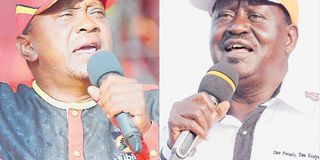OPINION: Politics, economy, change: Kenya case

The roller coaster that is Kenya’s never-ending contest for the Presidency enters another fortnight of intrigue, drama and even more drama.
Monday last week interested parties stayed up late into the night to file two cases against the election of Uhuru Kenyatta as president in an election – no surprise there -- that was always going to be contested in the Supreme Court.
Mark you, Raila Amolo Odinga was not among the litigants and the dear reader might wonder why?
In an interesting twist over the last one month, candidate Odinga discovered that he was talking to a stone-deaf ‘Independent’ Electoral Commission. As a consequence he withdrew his candidature from the repeat poll that was ordered by the Supreme Court.
As a consequence, Raila not only withdrew from the election but went on to call for a boycott of products of a select number of companies which he said were guilty of hobnobbing with “electoral thieves” and thereby subverting the “will of the Kenyan people” for, a free, fair and credible election.
Fast forward to November 5 litigants showed up to contest the election of Mr Kenyatta but Mr Odinga was busy with his National Resistance Movement (NRM). Going by its clarion call of #Resist, Mr Odinga has led hundreds of thousands in migrating from Safaricom which was said to have been involved in the transmission of results in the August 8 election.
The other companies facing the boycott include Bidco and Brookside, the former owned by Vimal Shah, and the latter by the Kenyatta family.
There has been all manner of commentary on the recklessness of the steps taken by the Nasa coalition, arguing as some did that it was the highest form of disloyalty to the country by sabotaging the economy.
The Kenyan economy, or any other for that matter, is still predicated to the political environment. Going back to the immediate post-independence period, the Kenyan economy has always been embedded to the political economy. It explains why the richest oligarchs in Kenya have deeply entrenched roots in politics and keep handing leadership from one generation to the other.
It is not by accident that Deputy President William Samoei Ruto was recently in the company of a young son of Uhuru, Muhoho, and introducing him at campaign rallies.
Former President Daniel arap Moi created his own web. Yet the seeds that were planted in 1963 were never wiped out by 24 years of Moi’s rule.
Plain speaking, the disparity between rich Kenyans and the poor has never been so much about tribe than about those with long enough tentacles to dip into the trough. Tribe was used when the sugar producing factories in Western Kenya were destroyed (as oligarchs imported Brazilian sugar) or fishing industries were built away from Lake Victoria shores or the Coastline. All these were deliberate efforts to make the regions poor and dependent markets.
Come 2017 and #Resist is changing all that. Jobs may be lost and some companies may register humongous losses. But the more important message is being sent where it hurts: in the pockets. The Kenya Private Sector Alliance may want to review its “we are embedded with those in power attitude,” and join in the campaign for what must really be a strange point of infraction, a free, fair and credible election .
This boycott will be subject of study of many a masters business class locally and globally. And we in Tanzania should be ready to learn lessons from it.




